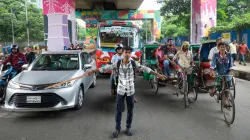Bangladesh students who ousted Hasina still leading streets to top ministries | What's next?
Within a week of unseating Bangladesh’s longest-serving prime minister, the students who drove out Sheikh Hasina were still directing Dhaka’s traffic. The question now is what comes next in a country still reeling from the violence surrounding her removal that left hundreds dead.

Dhaka: Several Bangladeshi students, who were behind the ouster of former prime minister Sheikh Hasina, are still controlling traffic on the roads in the country despite traffic police personnel rejoining their workplaces. A wave of violence, including revenge killings and arson, persisted after Hasina fled to India on August 5. Almost all of the country’s police officers went into hiding, afraid of reprisals for the force’s role in the deaths of hundreds of young protesters demanding the scrapping of quotas in government service jobs.
In such a situation, the students came out on the streets and tried to regulate traffic. However, traffic police personnel rejoined their workplaces on Monday. Still, the students say they do not want to leave the traffic management to the designated units of the police, The Dhaka Tribune newspaper reported. Even on Wednesday, students were seen controlling traffic on the roads. There are also members of Ansar, Border Guard Bangladesh Red Crescent, Scouts and Bangladesh National Cadet Corps (BNCC). A limited number of traffic police were also seen on the roads.
Students were managing traffic, checking licenses and reminding people to use helmets. The students say that they want to stay on the streets until full order is restored.
Traffic police praise students effort
Meanwhile, traffic police personnel say that students have played a commendable role in controlling traffic during a critical period. But now that the traffic policemen have rejoined work, the students are no longer needed there. Enayet Ullah, a student of psychology at Dhaka College and a volunteer of Bangladesh Red Crescent Society said: "We have been working on traffic control since August 7 on behalf of Bangladesh Red Crescent Society.
"There are no instructions for us to move off the roads yet. Since the traffic police have started working, we no longer need to be on the streets. But we are ready to contribute to the country if required in the future as well,” Ullah said. Sheikh Rafiq Swadhin, a second-year student of Philosophy at Dhaka University, and 20 others were regulating traffic in Dhanmondi yesterday. He said: "We will build a beautiful country together. We will remain in the field until further orders. The policemen are here but their number is not significant. They are not playing a strong role yet.”
A few more days on the streets: Students
Sami Chowdhury, a student at Southeast University, said: "We will be on the streets for three more days. The situation is still not fully under control. There is panic among the police.” Traffic Constable Jewel said: "There are students, Ansar and BGB members on the streets. We have two traffic policemen at the spot. There is no need for more people.” Traffic Sergeant Mahmudul said: "From today, all our policemen have joined work. Students are no longer needed here. But that's their decision.”
Additional Commissioner of Police (Traffic) of Dhaka Metropolitan Police (DMP) Munibur Rahman said: "The students played a commendable role during a period of crisis. Our traffic policemen have joined their duties. We have seen students greeting them with flowers.” "We have already discussed the matter with the students. They can leave the roads if they want to. They have studies. But it is their decision. If they want to cooperate, they are always welcome from our side," the newspaper quoted him as saying.
The student protests began in early July, starting as peaceful demands to scrap quotas in government jobs, before turning into a wider movement which toppled Hasina's government. Hasina urged police to clamp down hard on the protestors, referring to them as "not students but terrorists who are out to destabilise the nation". The recently formed interim government led by Nobel laureate Muhammad Yunus has some student leaders. He has appealed to students to cooperate with his administration to restore peace in the country.
What's next in Bangladesh?
But concerns are also simmering over their lack of political experience, the extent of their ambitions and crucially, how long it will take the interim government to organize elections. Already, the student ministers along with the protesters have said that before any vote is held, they want to reform the country’s institutions — which they say have been degraded by both the Awami League and its rival, the dynastic Bangladesh Nationalist Party.
Why do experts warn of the current situation?
Experts warn, however, that the interim government is unelected and as such it has no mandate to implement major changes.
Controlling traffic for a few days is one thing but potentially appointing students into ministries could make them “power hungry” at an especially sensitive time, said Rahman. Nahid Islam, the other student-turned-minister, acknowledged that they have no governance experience but said the grit and determination they showed in pushing out Hasina was proof that they can get things done. “We think the students who have succeeded in leading an uprising … and the citizens are capable enough to build the nation,” said Islam, who was born in 1998 and now runs the Ministry of Information and Technology.
(With inputs from agency)
Also Read: 'That's laughable': US on allegations of Biden govt's involvement in Sheikh Hasina's ouster